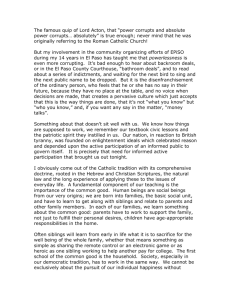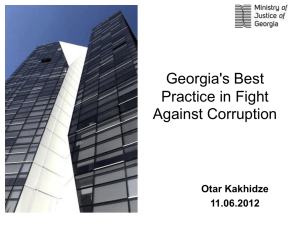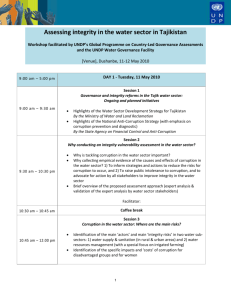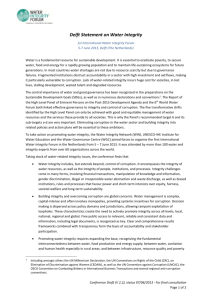Connecting the Links: The Media, Exposing Corruption, and
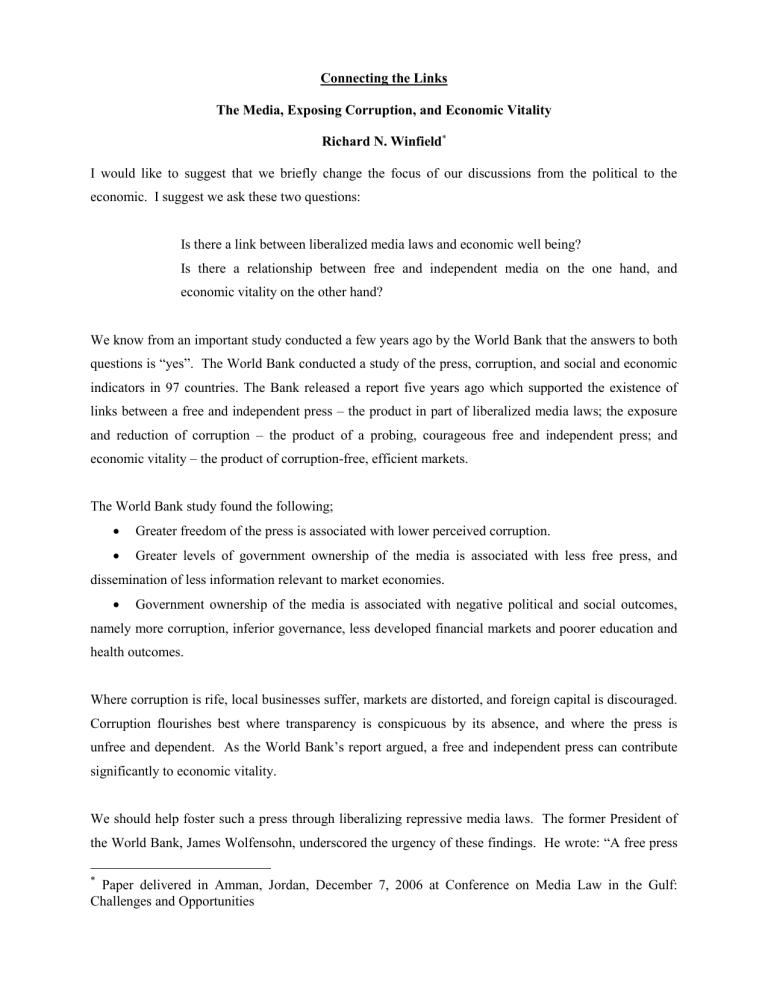
Connecting the Links
The Media, Exposing Corruption, and Economic Vitality
Richard N. Winfield *
I would like to suggest that we briefly change the focus of our discussions from the political to the economic. I suggest we ask these two questions:
Is there a link between liberalized media laws and economic well being?
Is there a relationship between free and independent media on the one hand, and economic vitality on the other hand?
We know from an important study conducted a few years ago by the World Bank that the answers to both questions is “yes”. The World Bank conducted a study of the press, corruption, and social and economic indicators in 97 countries. The Bank released a report five years ago which supported the existence of links between a free and independent press – the product in part of liberalized media laws; the exposure and reduction of corruption – the product of a probing, courageous free and independent press; and economic vitality – the product of corruption-free, efficient markets.
The World Bank study found the following;
Greater freedom of the press is associated with lower perceived corruption.
Greater levels of government ownership of the media is associated with less free press, and dissemination of less information relevant to market economies.
Government ownership of the media is associated with negative political and social outcomes, namely more corruption, inferior governance, less developed financial markets and poorer education and health outcomes.
Where corruption is rife, local businesses suffer, markets are distorted, and foreign capital is discouraged.
Corruption flourishes best where transparency is conspicuous by its absence, and where the press is unfree and dependent. As the World Bank’s report argued, a free and independent press can contribute significantly to economic vitality.
We should help foster such a press through liberalizing repressive media laws. The former President of the World Bank, James Wolfensohn, underscored the urgency of these findings. He wrote: “A free press
*
Paper delivered in Amman, Jordan, December 7, 2006 at Conference on Media Law in the Gulf:
Challenges and Opportunities
is not a luxury, it is at the core of equitable development. The media can expose corruption. They can keep a check on public policy by throwing a spotlight on government action. They let people voice opinions on governance and reform and help build public consensus to bring about change.”
The World Bank study of 97 countries makes some convincing arguments:
1.
Markets thrive on information of all kinds that is accurate, comprehensive, on time and objective. Information of that kind is oxygen to free markets.
2.
information.
Compared to free and independent media, state-owned media fail to provide that kind of
3.
Deprived of that kind of information, markets are far less vigorous than they could be, and the economy generally remains stagnant in countries with predominantly state-owned media.
4.
People in countries with heavily state-owned media are more likely to suffer hard times economically than countries with predominantly free and independent media.
Let me illustrate. Until the late 1980’s, South Korea imposed choking restrictions on the print press.
Only a handful of newspapers were licensed to publish. Until this time, South Korea was among the poorest nations in Asia. Then in the late 1980’s South Korea elected to liberalize its licensing laws. The number of daily newspapers increased markedly, growing from six to seventeen in Seoul, Korea alone.
This resulted in a blossoming, competitive newspaper industry that was diverse with opposition and progovernment and business papers competing with one another. The meteoric growth of the media sector coincided with the takeoff of the economy of South Korea. South Korea today has one of the most competitive, free-wheeling media markets and is among the most prosperous economies in Asia.
To explain this phenomenon, recall the statement of Amartya Sen, a winner of the Nobel Prize in economics. He wrote that there has never been a serious famine in a country where there exists a moderately free press. Let me add a note of explanation. The World Bank Survey cautiously concludes that, for instance, a relationship exists between heavily state-owned media and poor economic outcomes.
The study carefully avoids cause-and-effect language.
The World Bank study addresses the links among the government, corruption, the media and economic outcomes. The study offers these compelling arguments:
1. State-owned media are not likely to investigate and exposure corruption at high levels in their government.
2. Where state-owned media are dominant, corruption is likely to flourish in the absence of an aggressive watchdog free and independent media.
3. investment.
4.
Pervasive high level corruption is often the kiss of death to sustainable foreign direct
The dominance of state-owned media and the absence of free and independent media are associated with high level corruption and disincentives to foreign direct investment.
5. The cost can be measured in stagnant, under-performing economies.
The World Bank report points out the example of Mexico which undertook privatization of broadcasting in 1989. Privatization substantially increased the coverage of government corruption scandals and other stories previously unreported by the state-owned station. This greater coverage contributed to a 20% increase in the private station market share, forcing the government-owned station to cover these issues as well.
The World Bank survey also disclosed that countries with repressive media laws are associated with poor economic outcomes. The study singled out for particular mention the widespread and abusive practice of politicians suing the media for criminal and civil defamation. The politicians’ purpose or effect is to punish critical coverage and to deter future criticism. Where the media face abusive defamation actions by public officials for their exposure of corruption, you can be sure that corruption will not be investigated and exposed. Rather, it will flourish.
Let me illustrate. In Armenia, the wife of a prominent candidate operated a prosperous business selling diamonds which she and her confederates had smuggled across the border, duty free. Corrupt customs officials helped the lady. A newspaper editor published a news story accurately exposing the diamond smuggling operation. The political candidate, not his wife, filed a criminal defamation action and won.
The court fined the editor who was convicted of a crime.
I suggest that the real crime was that the law punished an accurate exposure of corruption, making it less likely that the media will attempt to investigate and expose other corruption. Are there any economic effects? First, legitimate diamond merchants suffer from unfair competition from the smuggler; the domestic diamond market is distorted. Second, the nation loses some customs duties. Third, with the media neutered from pursuing corruption investigations, corruptible public officials can operate with impunity. The World Bank argues convincingly that corruption is a major impediment to equitable economic development.
A country that punishes the media for exposing corruption should not be surprised if many of its public officials are corrupt. It should not be surprised if foreign investors recognize that the cost of doing business is too high and too risky. It should not be surprised if its economic performance suffers in
comparison with similarly situated countries where the media investigates and exposes corruption without fear of abusive litigation by politicians.
Here is an illustration. Less than 10 years ago the Kingdom of Jordan warehoused some surplus
Kaloshnikov assault rifles it had bought from the German Democratic Republic. A group of Peruvian army officers bought about 50,000 Kaloshnikovs and paid with Peruvian currency. A shipment of 10,000
Kaloshnikov assault rifles was loaded in Amman for shipment by air freighter to Lima, Peru. The
Kaloshnikovs, however, never reached Peru. As the aircraft flew over the jungle in Colombia, the
Kaloshnikovs were conveniently air dropped by parachute into the waiting arms of Colombia’s Marxist guerillas, the FARC. The plot was unraveled by the CIA and some courageous journalists in Peru. It turned out to be a guns-for-drugs deal engineered by the shadowy chief of Peru’s intelligence service,
Vladimir Montesinos. Peruvian media exposed the plot, forcing Montesinos to flee Peru. Montesinos was captured and tried. His patron, President Fujimori abruptly resigned and fled to exile in Japan. The
World Bank report saw an object lesson in the role of the Peruvian media in exposing corruption. Free and independent media investigated and exposed high level corruption; the story raised the stakes against future corruption by increasing the risks that the next corrupt politician may be similarly exposed and punished. The risk of exposure of corruption is higher with effective media. The media, according to the report, also helped build a public consensus required to fight corruption – creating the public approval that presses corrupt agents to resign – raising the penalties for corruption. And finally, Peru’s treasury funds might in the future become more secure from similar plots.
Finally, we have fleshed out our answers to the questions I posed at the outset. A strong, free and independent media is essential in creating and sustaining equitable economic viability, and liberalized media laws contribute to the vitality of free and independent media.
We have looked at the picture of the media and media law from the perspective of how they relate to a country’s economic health. As we continue to study the future prospects for the media and the media law in the Gulf, we should not lose sight of the possibility that the economic well-being of millions of people might be affected by the decisions that you and your government make in the years ahead.




